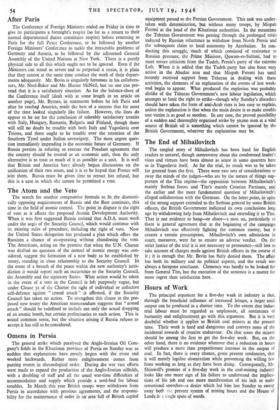The Atom and the Veto
The search for another compromise formula to fit the diametri- cally opposing requirements of Russia and the Rest continues, this time in the field of atomic control. The point in dispute is the right of veto as it affects the proposed Atomic Development Authority. When it was first suggested Russia insisted that A.D.A. must work Lander the aegis of the Security Council, which would continue with its existing' rules of procedure, including the right of veto. Now the United States delegation has produced a plan which offers the Russians a chance of co-operating without abandoning the veto. The Americans, acting on the premise that when the U.N. Charter was drafted no question of the control of atomic energy was con- sidered, suggest the formation of a new body to be established by treaty, standing in close relationship to the Security Council. In the event of a breach of the peace within the new authority's juris- diction it would report such an occurrence to the Security Council, the Assembly and the signatory States. What action would be taken in the event of a veto in the Council is left purposely vague, but under Clause 51 of the Charter the right of individual or collective self-defence against " armed attack " is affirmed, if the Security Council has taken no action. To strengthen this clause in the pro- posed new treaty the American memorandum suggests that "armed attack " should be redefined to include not only the actual dropping of an atomic bomb, but certain preliminaries to such action. This is sound common sense, but the situation arising if Russia refuses to accept it has still to be considered.


























 Previous page
Previous page